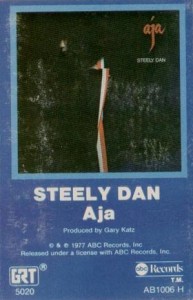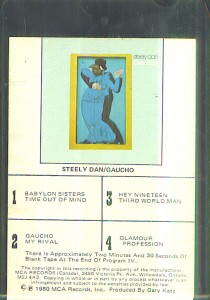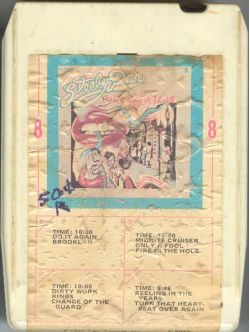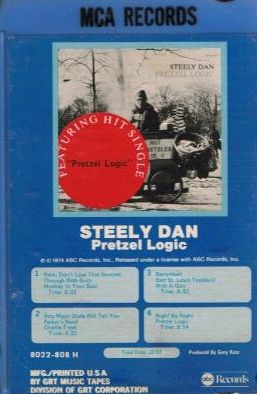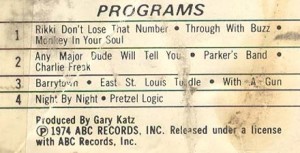Donald Fagen, Eminent Hipsters (2013)
Friday, August 8th, 2014No insights here about Steely Dan LP/cassette song sequences I’ve puzzled over in these pages. Just disarming short essays about the Boswell Sisters, Henry Mancini, Ike Turner, Alfred Korzybski and General Semantics, Ray Charles, Jean Shepherd, NYC jazz radio in the 50s and 60s, Bard College, and Ennio Morricone. This is all topped off with grouchy journal entries from the “Dukes of September” tour with Boz Scaggs and Michael McDonald. This whole thing was so much fun I’ll likely reread it for kicks.
P. 106: “JULY 6. I’m finally back in a civilized hotel, the Four Seasons on Elliott Bay in Seattle…They have a serious spa here and there’s just time enough to get a massage…I drew a girl – let’s call her Naomi – who was young and pretty, which is always nice. But she looked a little scrawny for the job.
“Working on the backs of my calves with some minty oil, she asked me if I wanted her to go deeper, so I said sure, a little bit. Suddenly Naomi from Seattle turned into Rosa Klebb, the SMERSH interrogator from the James Bond series. I couldn’t believe the force with which she was driving her knobby little knuckles into my petrified muscles and tendons. It was excruciating, but I have this stupid thing – like, no son of Staff Sergeant Joseph Fagen, veteran of the Big One, is going to whine about a little pain in front of some strange girl. Finally, all greased up and smelling like a Twizzler, I limped into the elevator in my bathrobe, crab-walked back to my room and started to pack for the gig.”
I’m still laughing about Fagen’s report from San Antonio.
Pp. 121-122: “JULY 18… [T]he ambling ghost of Fess Parker intersects our path. In 1955, the elders of San Antonio, Texas, after noticing the influx of tourists following the final episode of the Davy Crockett series…got some Disney architects to look at the river, resulting, many years later, in a sort of San Antonio Land, which is the present-day River Walk. Our hotel is on the River Walk, and that’s why I was awakened earlier than I wanted to be by a loud mariachi band just outside the window.
“…I’m back from the show. The house was a legion of TV Babies, maybe tourists from Arizona. I don’t know. Probably right-wingers, too, the victims of an epidemic mental illness that a British study has proven to be the result of having an inordinately large amygdala, a part of the primitive brain that causes them to be fearful way past the point of delusion, which explains why their philosophy, their syntax and their manner of thought don’t seem to be reality based. That’s why, when you hear a Republican speak, it’s like listening to somebody recount a particularly boring dream.
“…The crowd sat through our versions of some of the great sixties soul tunes, hating them, waiting only for the amygdala-comforting Doobie Brothers hits that Michael sings, Boz’s dance numbers and the Steely Dan singles that remind them of high school or college parties…Toward the end of the show, during McDonald’s piano introduction to “Takin’ It to the Streets,” I think I really made [backup singers] Carolyn and Catherine uncomfortable by walking back to their riser and telling them, as a way of venting my rage, that I’d been imagining a flash theater fire that would send the entire audience screaming up the aisles, trampling each other to get to the exits, ending up in a horrible scene outside on the sidewalk with people on stretchers, charred and wrinkled. When things aren’t going well, the girls, standing just behind me, have to listen to my insane rants. If they’re singing, I’ll rant to Jim Beard, playing keyboards on the next riser, or, if he’s busy, I’ll walk across the stage and harass the horn players.”


